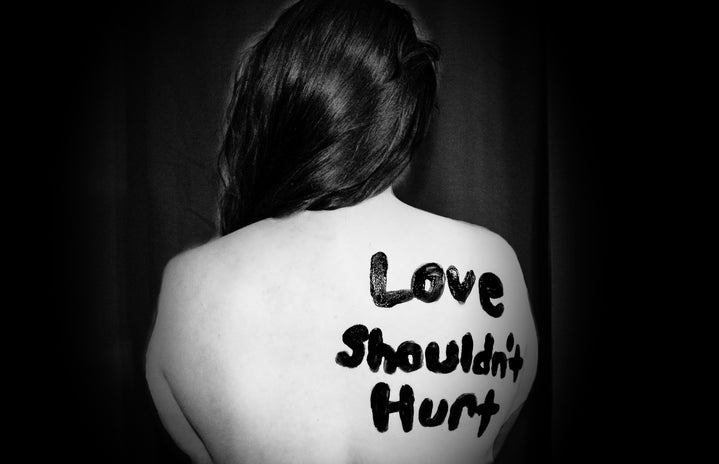To love and be loved is one of the most beautiful experiences in life. As humans, our whole purpose is to form connections, whether they are authentic or not. Our need for love often leads us into relationships and friendships that are not always as fulfilling as we truly deserve. Once in love, we forget all we know and wear our rose-colored glasses, ignoring every single red flag and concern. For five years, I was trapped in this very cycle, in denial and telling myself it was totally normal to celebrate my one year anniversary crying alone because a car show was more important than me. After ending that relationship and moving on, I am finally capable of deciding when enough is enough and when it’s time to let them go.
Knowing the signs:
Unhealthy Communication
All relationships in life rely heavily on communication. Sometimes communicating with others can be extremely hard, but if not done effectively it can have negative repercussions. Healthy communication can be defined as the exchange of information without harmful responses. Unhealthy communication can lead to negative behaviors such as passive-aggressiveness, defensiveness, interrupting, belittling, or simply not listening. Healthy communication, in my opinion, is a skill that requires immense practice—if it’s not worked on, respectful communication can be unachievable. In the beginning of a relationship, you may notice these unhealthy communication patterns; If both partners are committed to improving communication and nothing changes over time, it could be a sign that the relationship has become toxic.
Excessive Control or Jealousy
We have all been jealous before, and while it is impossible to end all feelings of jealousy, excessive jealousy can quickly turn a relationship unhealthy. This excessive jealousy can cause us to feel out of control, which often leads to controlling behavior in an attempt to gain back more feelings of security. Jealousy usually comes from a deep rooted feeling of insecurity, but this is never a valid reason to control a partner. In a relationship, excessive control and jealousy may look like constant monitoring of activities, dictating friendships, isolating a partner from family or friends, enforcing strict rules or ultimatums, frequent accusations of cheating, and demanding access to personal devices. A healthy relationship should be built on trust, where both partners feel secure enough to live their lives freely without control. Although every relationship has unique boundaries and privacy levels, these controlling behaviors are red flags that signal an unhealthy dynamic and may be a reason to consider stepping away.
Lack of Respect
Respect is often seen as something that must be earned, yet in any healthy relationship, it should just be a given priority. To respect someone means to recognize their value and worth, treating them as such. The moment respect is lost in a relationship, it becomes unhealthy, due to lack of trust, empathy, and security. Disrespect can show up as name-calling, crossing boundaries, not taking accountability, invalidating feelings, and even verbal or physical abuse. These behaviors are the absolute opposite of love, and if these signs of disrespect are present in your relationship, it may be a sign that it’s time to let go and prioritize a healthier, more respectful connection.
Infidelity
Infidelity is one of life’s most painful betrayals that breaks all trust, respect, and emotional security that a healthy relationship relies on. When a partner cheats, it can completely destroy your self esteem and leave you feeling not enough. While some couples may try to rebuild after infidelity, it can be extremely difficult due to the break of trust. Staying can mean constantly questioning your partner’s loyalty and possible resentment that may never go away. Leaving someone you love can be so hard, but it allows you to focus on healing, rebuilding self confidence and eventually finding a relationship that is rich in trust, loyalty, and respect. Infidelity is a clear indication that the commitment was compromised, and the relationship is unhealthy. Walking away can be a healthy, empowering choice to prioritize your well-being, but leaving is extremely hard and therefore grace and patience should always be given in any decision no matter what you decide to do.
Negatively Impacting Mental Health
One of the clearest signs that it’s time to leave an unhealthy relationship is when it starts to impact your mental health. A relationship should add value to your life, instilling happiness, security, and growth—not taking it away. When your relationship begins to create feelings of anxiety, depression, emotional exhaustion, or a loss of self, it is a sign that the relationship may be toxic. If you’re experiencing these emotions, prioritizing yourself is so beyond important. Leaving a relationship that negatively impacts your mental health is a necessary step to regain stability, self-worth, and peace, allowing a space for healthier, more beneficial connections in the future.
How to Finally Let Go
Letting go of someone I loved deeply, yet who could never fully love me back, was one of the hardest experiences of my life. There’s no manual on making this process hurt less, but there are steps to ease the pain. Starting with boundaries and a gradual withdrawal helped me adjust to the reality of life without them as a constant presence. Communicating my decision and seeking support from friends and family provided the validation and strength I needed, allowing me to process my emotions with the reassurance of people who genuinely cared. The final, most essential step was dedicating time to self-love through reflection, self-care, and patience. I filled my days with new hobbies, quality time with friends, journaling, and anything that nurtured me. It was a bumpy road—some days were tougher than others—but three years later, I’m so grateful I let them go. I spent years believing I was not enough, but now I have found someone who loves me and values me fully—and that person is me.
“If I’m not enough for you, you’re not enough for me”
-Oliva Rodrigo
The National Teen Dating Abuse Helpline is 1-866-331-9474. They also offer support via text by texting “LOVEIS” to 22522. You can also visit their website, loveisrespect.org, for more resources, live chat, and information on healthy relationships.


